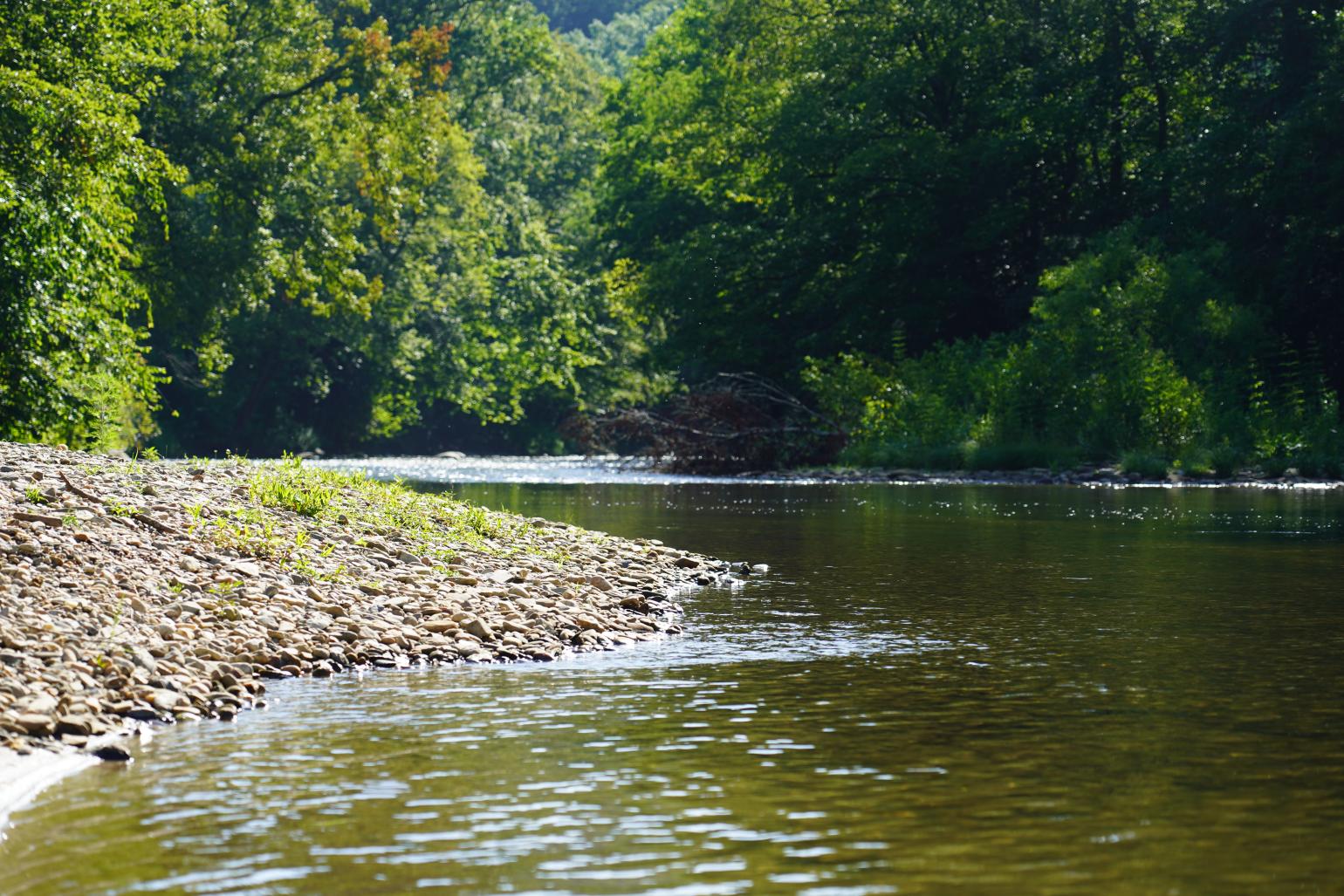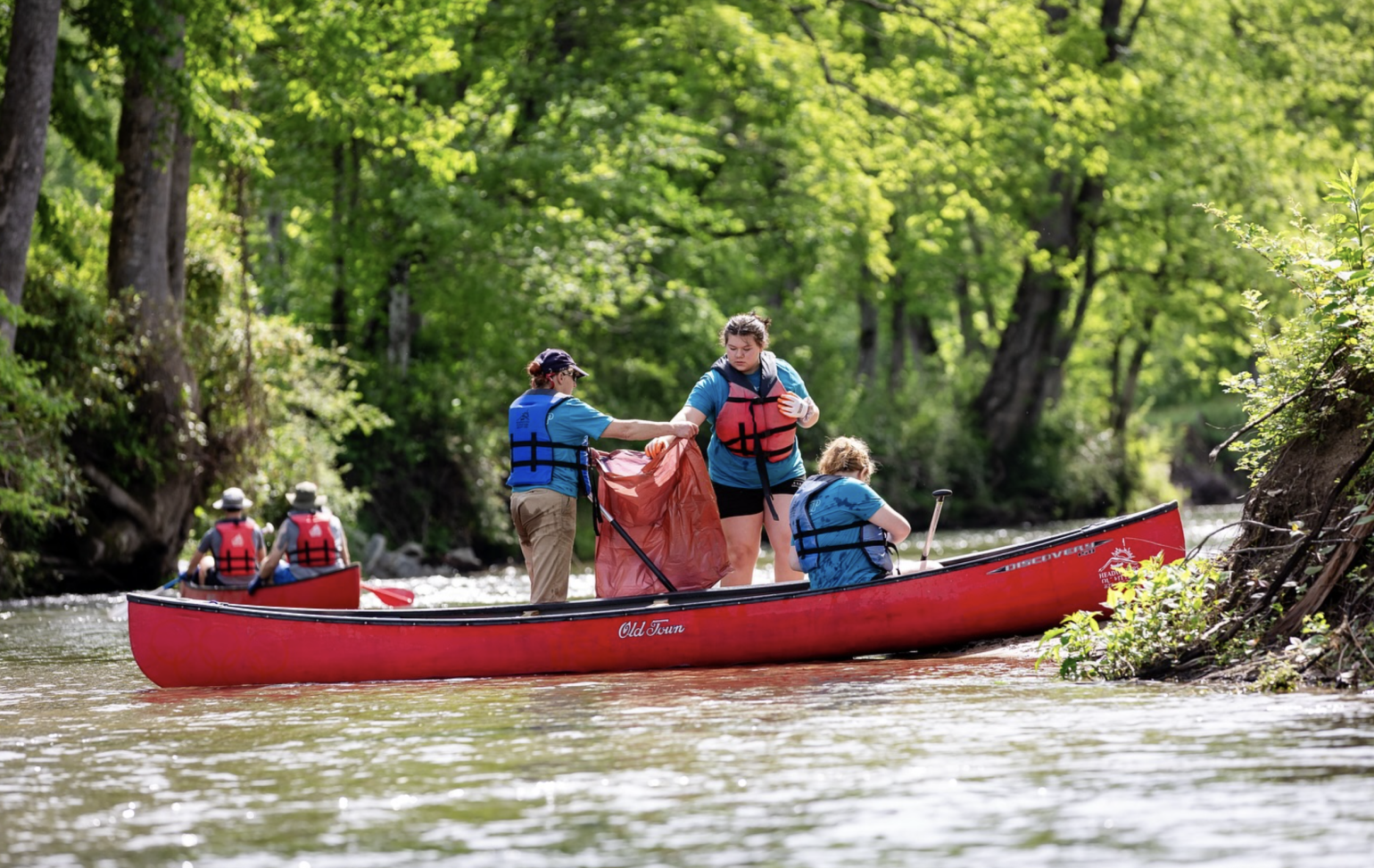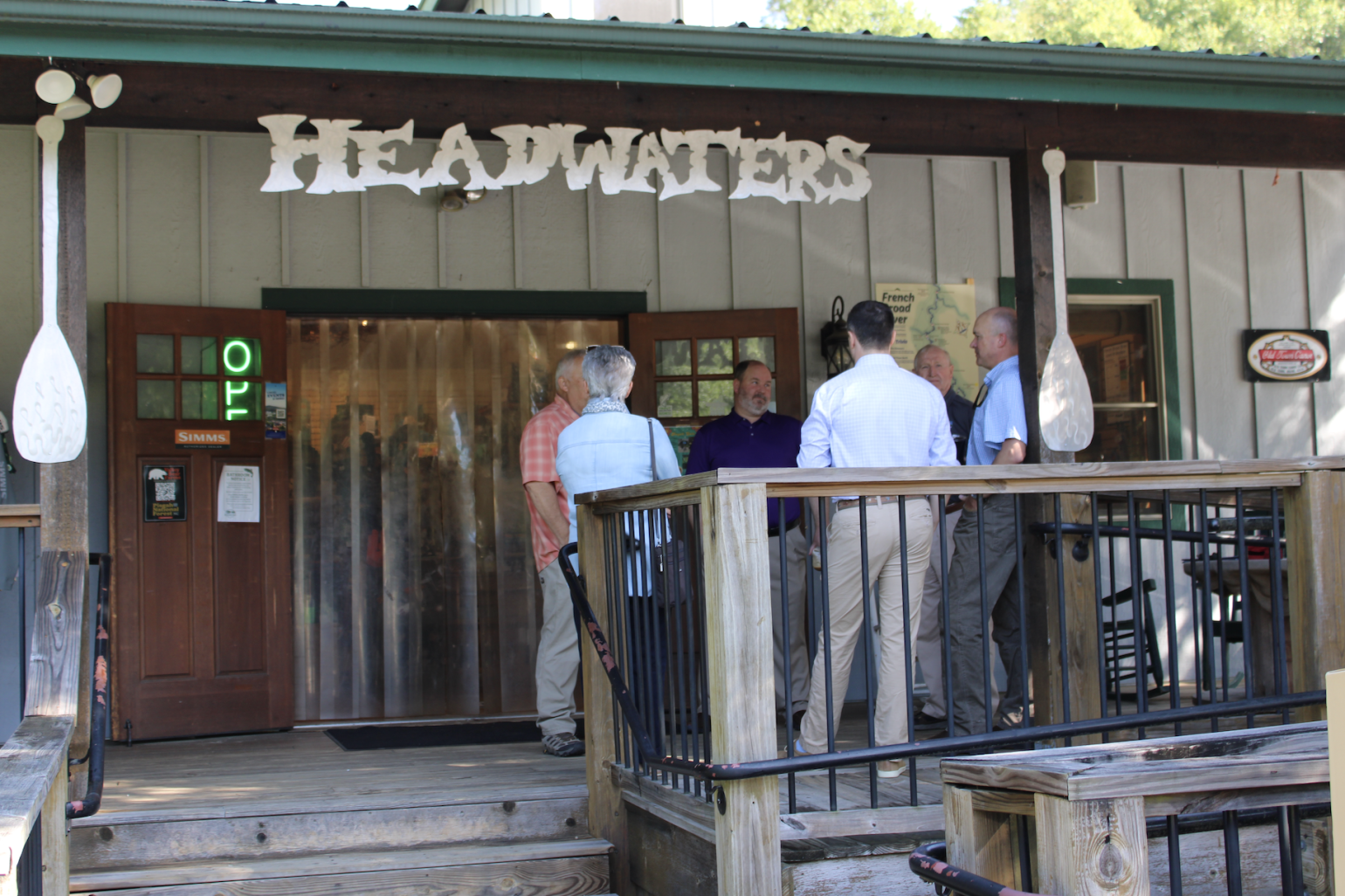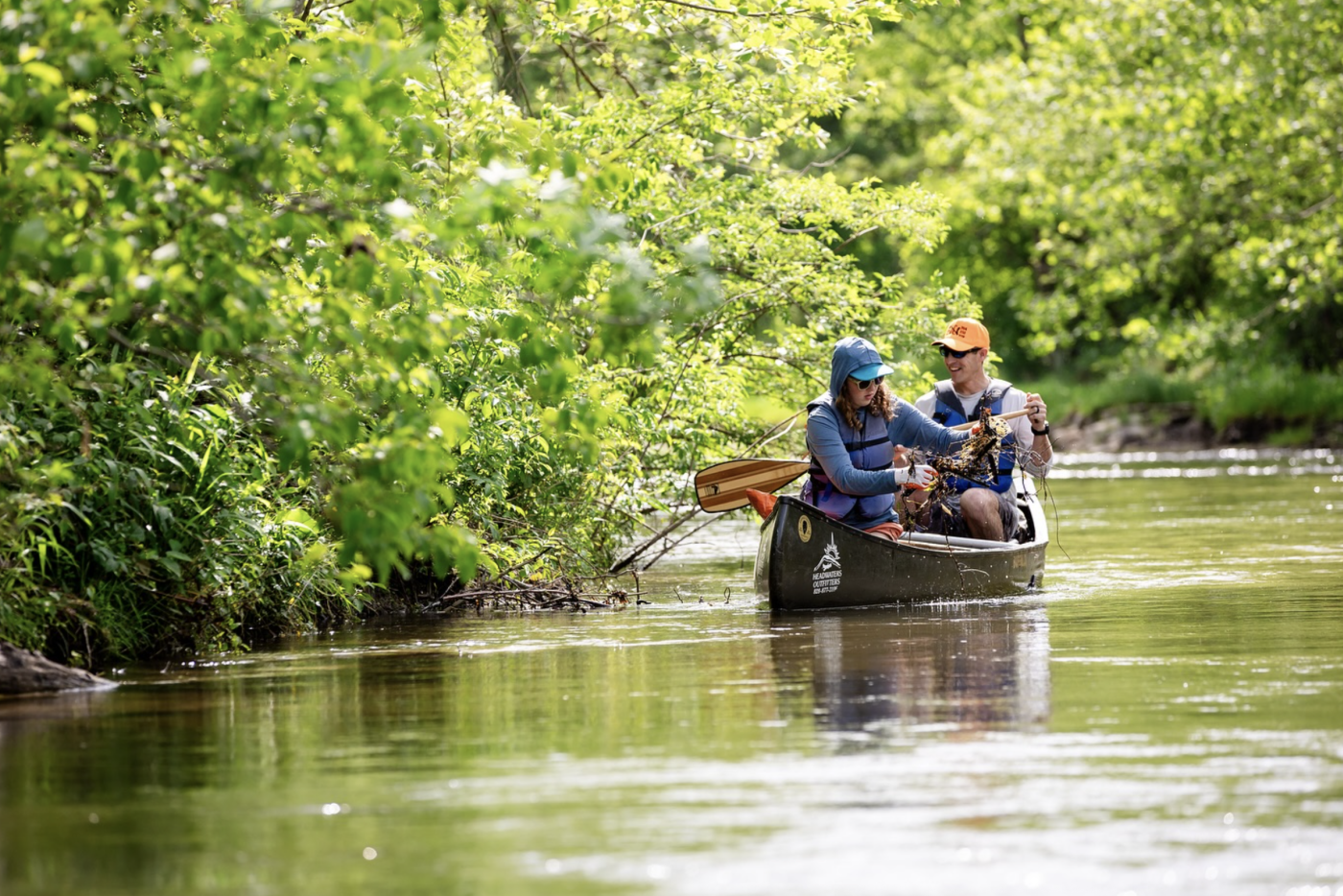A network of river outfitters and fly shops lines the waterways of western North Carolina, helping visitors and locals alike enjoy morning fishing expeditions, afternoon float trips, and evening swims. Even as they compete for customers, these business owners and guides share a deep respect for each other, for their community, and for the natural resources that enrich our mountain region. In July, leaders from the Governor’s Recovery Office for Western North Carolina met with a family-owned river outfitter in Transylvania County to learn about their experiences with river recovery and welcoming visitors back to float, fish, paddle, and wander.
The French Broad River is one of the oldest rivers in the world, fed by more than 4,000 streams and rivers. The river is home to native species like the smallmouth bass, brook trout, and the Hellbender, one of the largest salamanders found in North America. It’s also home to David, Debi, and Jessica Whitmire, who have been offering paddling and fly-fishing adventures to visitors and locals alike for more than 30 years at Headwaters Outfitters.
As the name suggests, their small business is located at the source or “headwaters” of the French Broad River in Rosman, North Carolina, just 10 miles from its natural forest origin. After Rosman, the river travels across Transylvania County to Henderson County, and then through Buncombe and Madison Counties. Along the way it flows through the City of Asheville, where it picks up the Swannanoa River and continues north toward Tennessee. The Whitmire’s and their community take seriously their impact on the river that reaches 219 miles before leaving North Carolina.
“It's a huge responsibility to be the headwaters of a major watershed because what we do majorly affects everyone downstream,” said Jessica Whitmire, general manager at Headwaters and daughter of co-owners David and Debi. “We pride ourselves in maintaining clean water from our headwaters up here in Rosman to the confluence with the Davidson River.”

With water that flows directly out of public lands and ongoing support from public land management partners, Jessica says there is a dedicated group of people who go above and beyond to make sure that Rosman is sending clean water to their neighbors down the river.
Headwaters Outfitters became a hub for area relief and recovery efforts immediately following Hurricane Helene. Led by Jessica’s mother, Debi, community leaders worked together from the early morning hours until late in the evening for two or three weeks to make sure people could find help and connect with supplies. “Our business was shut down, so we used a lot of salaried staff to help with distribution,” said David.
Within a few days, power was restored and the Whitmire’s began receiving news about Helene’s regional impact. A friend and fly shop owner in Burnsville was able to reach the Headwaters team. “He was doing a call for help, so all of our fly-fishing guides loaded up and a group spent two to three days out there helping,” said Jessica. “They have helped us before too. When somebody needs help, the paddling and fly-fishing community always comes together.”
When relief turned to recovery and restoration, the Whitmire’s saw an increasing awareness about river recovery among their neighbors. “We have had people reaching out to us that have property along the river who want to find out how to support their riverbanks,” said Jessica. “They want to get more involved.”
Local soil, water, and extension offices have been helpful to residents, collaborating to offer continued advice on next steps, according to Jessica.
“Part of the problem with the debris in the river was that it was so saturated that what we consider class one rapids almost became a class two,” said David. “It was difficult to manage, so having it removed is a big relief.”
Starting in March, David offered his strong community connections and decades of river experience to help educate debris removal crews as they navigated the Upper French Broad. By May, the family was able to host its annual river clean up, with help from volunteers across the county and beyond its borders. Loading up in canoes with garbage bags and grabber tools, crews took off from Headwaters Outfitters to remove trash in and along that first 10 miles of the river.

As the summer season arrived, business began picking up. “It’s been pretty good,” said Jessica. “It’s not fully back to normal, but it’s getting better.”
The Whitmire’s enjoy listening to the reactions of long-time customers as they return to the river for the first time since Helene, impressed by its recovery. “The river looks fantastic right now,” said David. “I think it may be in better shape to take on more and look better than it ever has.”
Clean-up and recovery are still underway in Transylvania County and across western North Carolina. The Whitmire’s are thankful for everyone who has pitched in to protect the French Broad and get people back on the water. “We really love giving folks a chance to spend 3 hours and 8 miles in a boat, seeing the river, the rhododendron, the bears, and bald eagles,” said David. “It’s a special river. We’ve made a living off of it and our lives have bent around it.”
The French Broad is among a long list of coveted natural resources attracting visitors into Transylvania County and across western North Carolina. “We are home to Sliding Rock, Brevard Music Center, the French Broad River, 250 waterfalls, the edge of the Blue Ridge Parkway, Headwaters State Forest, Dupont State Forest, Gorges State Park, and Pisgah National Forest,” said Clark Lovelace, Executive Director of the Transylvania County Tourism Development Authority. “We are really proud of what we have to offer visitors and day-trippers, and what these resources bring to the entire region.”

After visiting Rosman, the GROW NC team joined local economic and business support leaders for a tour of downtown Brevard and a visit to the Ecusta site, where plans are underway to connect the towns of Brevard and Hendersonville along the 19-mile Ecusta Trail. The team also toured the adjacent Sylvan Valley Industrial Center, which is home to outdoor recreation product manufacturer Sylvan Sport and the canning operations for Oskar Blues Brewery.
The GROW NC team shared ongoing recovery resources offered to help communities recover from Hurricane Helene. “We’re urging local leaders to apply for state-funded programs like the Small Business Infrastructure Grant Program, offered to local businesses to improve or restore commercial vitality,” said Matt Calabria, GROW NC Director. “There are a number of active programs offering funding to help communities rebuild and we want to make sure local leaders take advantage of this support.”
Find a list of recovery resources on the GROW NC website, along with regularly updated recovery data and links to related news and updates. Subscribe to monthly email updates about recovery progress and follow GROW NC on Twitter and Facebook to stay connected with recovery updates.

